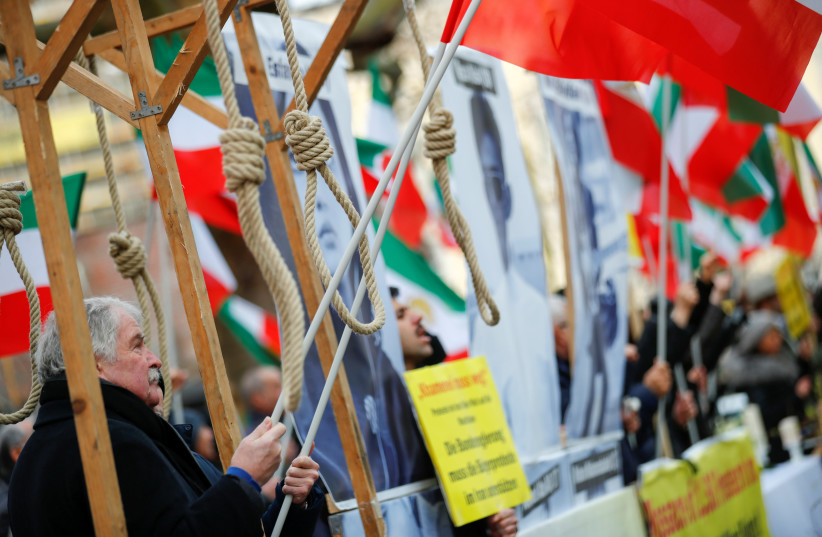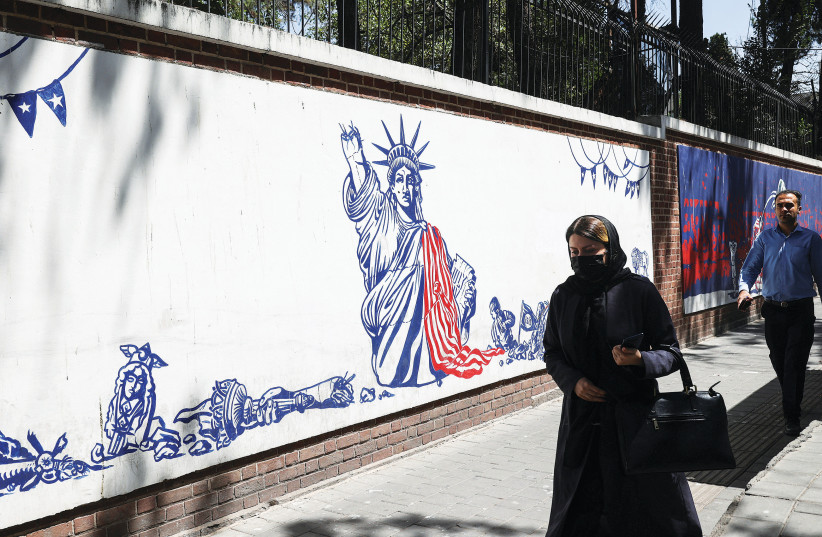The news organization controlled by the Islamic Republic of Iran's Supreme Leader Ali Khamenei urged on Wednesday that the Iranian authorities seize and prosecute German diplomats in Tehran in response to Berlin's expulsion of two Iranian diplomats.
Kayhan, the news outlet that serves as Khamenei's mouthpiece, demanded that German embassy staff not be allowed to leave Iran in response to Berlin's eviction of two Iranian diplomats on Tuesday due to the clerical regime imposing the death penalty on the German citizen Jamshid Sharmahd, who is also a legal resident of California.
The fiercely anti-Western and antisemitic editor-in-chief of Kayhan, Hossein Shariatmadari, who is also Khamenei's representative, urged the prosecution of an "intelligence officer stationed at the German embassy."
Shariatmadari claimed in his article, without proof, that "Sharmahd has been tasked with carrying out terrorist operations by the German government, and the action of the German Ministry of Foreign Affairs in summoning the Iranian ambassador and expelling two employees of Iran’s embassy is a type of deception operation to wipe off the traces of the German government’s involvement in this terrorist operation.”
Shariatmadari added that "The next step should be filing a complaint against the German government at the International Criminal Court for sending terrorists to Iran to massacre the oppressed people of the country."
Kayhan wrote "In the first step, Iran can and should ban the members of the German embassy from leaving."
The Middle East Media Research Institute (MEMRI) published translated sections of the Kayhan article.

Death sentence announced
The theocratic state announced on Tuesday that the 67-year-old Sharmahd was sentenced to death after being convicted of "corruption on earth." Iran's regime carried out a show trial against Sharmahd who was framed by the authorities, say his family and human rights groups.
Jamshid is the spokesperson for the Kingdom Assembly of Iran, whose origin is in Iran. Iran’s regime has alleged, without providing any evidence, that Sharmahd was complicit in a 2008 bombing of the Hosseynieh Seyed al-Shohada Mosque in the city of Shiraz. The regime claimed the bombing resulted in the deaths of 14 people, and 215 others were injured. Iranian regime agents kidnapped Sharmahd in Abu Dhabi in the United Arab Emirates in 2020.
The Iranian regime-controlled outlet Mizan, which covers judicial and legal affairs, labeled Sharmahd in a video as "the leader of the Tondar terrorist group,” and links him to the dissident Tondar party. Sharmahd and his family flatly deny the regime charges. Iran's judiciary provided no proof in its claim that Sharmahd is connected to the deaths in 2008 in Shiraz. Sharmahd was in California at the time and working as a radio journalist. Iran's regime initially reported in two state-owned media outlets that the explosion in Shiraz was triggered by ammunition that was stored at an Iraq war exhibition.
The violent rhetoric of Shariatmadari recalls the seizure of the US embassy and kidnapping of 52 United States diplomats and citizens in 1979 carried out by militant Islamists.
Jason Brodsky, the policy director for the US-based United Against Nuclear Iran, told the Post that "Hossein Shariatmadari is often one step ahead of the Iranian establishment on these kinds of issues. For instance, he has been advocating Iran withdraw from the NPT [Non-Proliferation Treaty] for years, but the Islamic Republic has not formally done so. He is thus often out over his skis, and him printing such a piece does not necessarily mean this is an official position of Tehran."
"Nevertheless, given Iran's own history in this regard--seizing the US embassy in 1979 and the ransacking of the British embassy in 2011--there is cause for concern. Additionally, there has been a risk-readiness in Tehran with foreign embassies recently, especially after the attack on the Azerbaijani embassy in Tehran some weeks back. So I would advise European governments to be especially attuned to these troubling trendlines."

"These coordinated moves en masse have a greater chance of getting the attention of Iranian decision-makers and shapers and should have been done a long time ago given the unacceptable roster of European nationals being held hostage by the regime. Hostage taking is also another data point as to why the EU should designate the IRGC [Islamic Revolutionary Guard Corps] as a terrorist organization."
Sheina Vojoudi, an Iranian dissident who lives in Germany and an associate fellow for the Gold Institute for International Strategy, told the Post that "This is the last effort of the Islamic Republic to save itself from falling. I can’t stop criticizing Germany for its relations with the Islamic Republic but at least we, the Iranians, know the Islamic Republic’s methods very well that these accusations against Germany and, of course, against Jamshid Sharmahd, are baseless to justify themselves for the charges against Jamshid Sharmahd."
"But the more important reason is to force Germany back away from its position against the Islamic Republic’s human rights violations and terrorist activities. There are multiple serious reasons for the Islamic Republic’s accusations against Germany. I can mention a few of them: Munich security conference without the participation of the Islamic Republic’s representative and the invitation of the crown prince of Iran Reza Pahlavi to the conference, Germany’s latest efforts to save Jamshid Sharmahd "
She said that it is not too late for Germany to impose additional sanctions against the Islamic Republic.
"For decades Germany negotiated and dealt with the Islamic regime in Iran despite all the crimes that this regime committed against the Iranians and humanity.
Germany should finally stand on the right side of history and don’t allow this criminal regime to blackmail Germany but, on the contrary, should act more courageously and close the Islamic Republic’s embassy in Germany, expel all the regime’s diplomats and also close all the Islamic centers which belong to the Islamic Republic in Iran.
The suggestion of a travel ban from Iran for German embassy’s employees is, in other words, hostage taking, for which the Islamic Republic excels."
Iran's reach in Germany
The German city-state of Hamburg allows the Khamenei-owned and controlled Islamic Center and Blue mosque to operate. The Islamic Center and Blue mosque promote antisemitism and mourned the US assassination of the US and EU-designated terrorist Qassem Soleimani, the commander of the Islamic Republic's Quds Force, who was killed in a US drone strike in Baghdad on January 3, 2020.
"Hossein Shariatmadari is often one step ahead of the Iranian establishment on these kinds of issues. For instance, he has been advocating Iran withdraw from the NPT [Non-Proliferation Treaty] for years, but the Islamic Republic has not formally done so."
Jason Brodsky, the policy director for the US-based United Against Nuclear Iran
The Post sent detailed press queries to German foreign minister Annalena Baerbock and German Chancellor Olaf Scholz, asking for a response about the Kayhan article's demand that German diplomats be banned from leaving Iran and prosecuted. The Post also asked what is the German government doing to secure the release of Sharmahd.
The Post questioned whether the German government will ramp up the pressure on Iran's regime to stop the execution of Sharmahd by severing diplomatic relations with Tehran, proscribing the IRGC as a terrorist entity, and pulling the plug on its over $1 billion annual trade relationship with Iran's regime.
A spokesperson for the German foreign ministry told the Post "the topics you are asking about have been repeatedly discussed in the government press conference.
"Also, Baerbock is regularly on the record with regard to Iran, four times only this week. For example last Saturday at the Munich Security Conference, Monday at the EU Foreign Ministers Council and two times after this week’s unacceptable death sentence against Mr. Sharmahd."
The Post followed up with a second query asking the spokesperson for copies of the discussions at the government press conference, as well as a response to Dr. Kazem Moussavi's criticism of Germany's alleged appeasement policy toward Iran. There is no mention of the topics raised in the Post query on the German foreign ministry website. The foreign ministry posted two press statements from foreign minister Baerbock that urged the regime not to execute Sharmahd.. She did not cite punitive measures that will be imposed on Tehran to secure Sharmahd's release beyond Berlin ejecting two Iranian diplomats and summoning the chargé d’affaires at the Iranian Embassy.
Traditionally, Germany has been viewed as the weakest European link in the European and American effort to isolate Iran's regime and stop its terrorism, illegal nuclear weapons research, human rights violations, and kidnapping tactics.
Kazem Moussavi, the spokesman for the Green Party in exile, told the Post that "As a political hostage, German citizen Jamshid Sharmahd became a victim of the appeasement policy. After more than two years under torture and solitary confinement, he was mercilessly brought before the terrorist regime in an illegitimate show trial and finally arbitrarily sentenced to death."
He added that ."I criticize the German government because, over the past two years, it has ignored all calls for help about Sharmahd's fate, claiming that it would use secret diplomacy to free the hostage, so as not to endanger German-Iranian relations and the nuclear talks with the mullahs. Sharmahd may be executed at any moment now, depending on whether his death sentence is upheld or not upheld by the Mullahs' Supreme Court."
Moussavi continued that "With the death sentence against Sharmahd, the regime not only wants to intimidate the regime's opponents but also blackmail the federal government."
Moussavi said if Chancellor Scholz wishes to save Sharmad's life, "Scholz must seriously threaten the regime with the consequent breaking of German relations with Iran and the nuclear deal and the immediate listing of the Revolutionary Guards in Germany and the EU as terrorists if Sharmahd is not released immediately. If Sharmahd is executed, Germany will suffer considerable damage to its political image."
